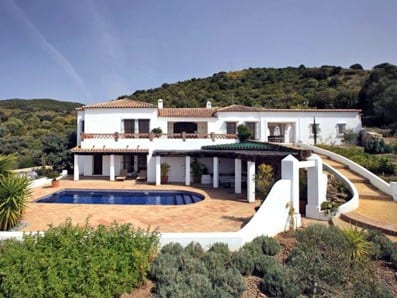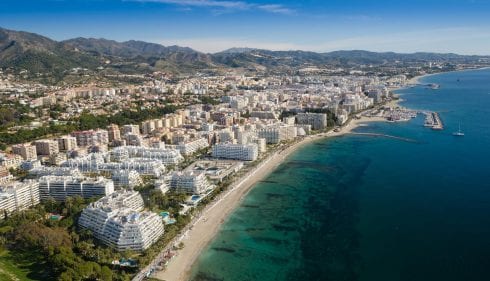CHRIS STEWART’S famous memoirs about living on a farm in inland Spain continue to inspire some to follow in his footsteps, but if you’re looking to buy a property in the country, getting good advice helps keep things sweet.
Not everybody wants to live near the beach. We get a steady flow of clients through our doors in search of a remote piece of land or house in the hills, away from it all, where they can live peacefully with nary a worry in the world. But buying country property in Spain can be a risky business if it is not going to be used for agricultural purposes or does not have the required municipal licenses to make building and living in it legal.
We discussed the potential pitfalls with Ignacio Pérez de Vargas, the principal of Pérez de Vargas Abogados, a well-known local law firm with offices in Estepona, Marbella, and Malaga. While the firm handles all kinds of cases, we regularly work with them on sales in the country, as Ignacio and his property team are recognised experts in the field (geddit?).
Ignacio says non-urban land (terreno rustico) is normally used for farming, livestock, or woodland purposes. So if you do want to buy land to build a home, you must submit a development project (proyecto de actuación) that justifies the need to do so to support the activity in question. Projects have to be approved by the regional government’s Environmental Agency before submission to the local town council to obtain a building license.
To make things more complicated, Ignacio explains, there are two different kinds of non-urban land: “Common land, in other words without legal protection, and non-urban land under special protection. On protected land, in general, construction is prohibited. If a property has been built on protected land and there is no municipal building license in place, purchase is not advisable.”
On the other hand, if a property is on common non-urban land, buyers should check it was given a municipal building license, subject to a development project, and a license of initial occupation. If a building license was not granted, ask the seller to obtain a certificate from the town council stating that the statute of limitations on demolition orders – “now six years, up from four,” Ignacio notes – has expired. Buyers should also be aware such properties still contravene town planning and, hence, can only be maintained rather than extended.
Owners of property on non-urban land can also experience difficulties when it comes to contracting utilities and connecting to municipal services, such as sewage systems, that are taken for granted when buying and building on urban land. “Buyers should request to see contracts from utility companies,” Ignacio suggests, “and check services work.”
While the same taxes are charged in Spain for urban and rustic land and property sales, cadastral values of non-urban land tend to be lower, Ignacio adds, meaning transfer tax (Impuesto de Transmisiones Patrimoniales) and municipal capital gains tax (Impuesto Municipal de Plusvalía) are also lower.










While it’s sensible to get good advice, unfortunately because of the way the Spanish legal system works, there is relatively little legal certainty in Spain. It’s quite possible to get the best independent advice, have absolutely all your paperwork in order, buy somewhere in complete good faith and still come a cropper when an authority decides to unilaterally move the goalposts. The Priors are just one well known example of how this can happen. There are many, many others. On top of this, because the Spanish justice system is, by its own admission, only designed to punish “chicken thieves” and because the system is so chaotic, slow and incomprehensibe (even to Spanish lawyers and judges) the chance of getting justice when things go wrong is slim and the probablility of compensation vanishingly small.
Well said Iestyn ap Robert. The Spanish legal system has no credibility whatsoever and the Priors’ case is a good example of this. How can any country actually feel good about itself having treated someone in this way?
It is worth noting that it is not just one or two people who have fallen foul of the system, it is thousands and many of them have had their lives ruined in the process.
I can’t believe an estate agent is writing about rural properties in Andalucia when a date has just been set for two more demolitions in Almeria. Yes, two more British owners have been taken for mugs after parting with their hard earned money only to have their houses declared “illegal” years after they purchased it in good faith. Both couples have been left homeless, have lost everything and are back in the UK living with relatives.
Meanwhile, Andalucia have the front to sponsor Aston Villa football club in the hope of getting more people to part with their money in the region. They must think that all Brits have “mug” tattooed across their foreheads.
Two more houses belonging to British are due to be demolished later this month. They are in Cantoria.
Of course, Adam Neale is talking down country properties for one reason, namely that he wants people to purchase properties, with him, on the coast.
i lived in spain 5 years and found the legal system complicated but once the locals know you they help normally and dont forget what happens to foreigners also happens to locals, locals have the upper hand because they know their territory but unwitting foreigners jump in and think they are in england where there is relatively openness,.it is no different to you buying in rural england without planning permission and someone telling you you can build a house there you wouldnt believe it and therefore the same caution should be used anywhere in the world not just spain
Anne you are another one who is ignorant of the issues. FACT. They used Lawyers and had all relevant paperwork. As for it happening to locals….the house next to the Priors and owned by Spaniard, is still standing.
anne, two properties were demolished yesterday – not a great time to decide to comment on this article was it? How many times do you need to be told that the victims had building licences and they used lawyers. Stop looking for excuses to make yourself feel better and no, it is nothing like buying property in rural England.
Anne, could be Derek writing your comments. ‘it is no different to you buying in rural england without planning permission’ I expect there have been the odd illegal build but not in the thousands that there are in Spain and the other difference is the solicitors here do not receive back handers and they don’t go down the bank to take 10’s thousands of euros out in cash and then handing the estate agent 20,000 in cash that the owner never receives, that is what happened when I purchased a place, the old people in their 80’s never got all of their money, stealing from the pensioners in Spain.
@anne, you sound like an agent making futile excuses and blaming the victims. How would you feel if you had worked all your life and ended in retirement homeless and penniless.
We don’t have to play the blame game, it is well documented who it is.